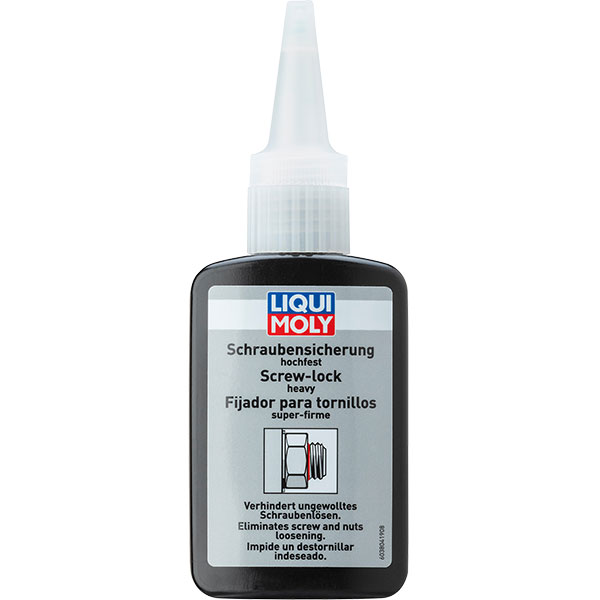
Liqui Moly Screw-Retainer High Strength - 50g
Fast, reliable medium strength screw-retainer prevents loosening due to vibrations and seals threads
DetailsRRP
£24.99
Select an option
Online
In-store
Seen it cheaper?
Get a price match
Get a price match
Delivery & returns
Quick find: 2508474
Description
Manufacturer
Liqui Moly Screw-Retainer High Strength - 50g
- Resistant to stresses and vibrations
- Can be used on oily surfaces
- Rapid curing
- Prevents leaks
- Wide operating temperature range
- Controlled torque / stress ratio
Prevents screw connections from working loose and loosening due to vibration. Cures rapidly and reliably. Can be used on oiled surfaces. Seals threads and prevents leaks. Has good chemical resistance. Wide operating temperature range from -60°c to +150°c.
Technical Data
Form: liquid
Breakaway torque: 36 Nm (DIN EN 15865)
Prevailing torque: 43 Nm (DIN EN 15865)
Chemical resistance: relatively well against oils, petrol, antifreeze, water, and brake fluid
Initial strength: 2-10 min (active); 10-60 min (passive)
Functional strength: 2-4h
Final strength: 8h
Operating temperature Range: -60 to 150°c
Thread friction value: 0,17
Compressed shear strength: 25 N/mm² (DIN EN 15337)
Base: dimethacrylate ester
Density: 1,1 g/cm³ (DIN EN 542)
Colour / Appearance: green
Odour: characteristic
Viscosity at 23°c: 500 mPas
Shelf life in original sealed container: 24 months
Recommended Storage temperature: 8-21°c
Application
Apply uniformly to bolts and nuts. Cures in the absence of air (anaerobic). One must differentiate between active and passive materials during the curing time. Active materials generally refer to metals with a high iron or copper content (e.g. iron, steel, copper, brass, bronze). Active materials ensure rapid curing. Passive materials such as high-alloy (stainless) steel, zinc, aluminium, or plastics only cure very slowly.
Screw-retainer High Strength Data Sheet
Technical Data
Application
Apply uniformly to bolts and nuts. Cures in the absence of air (anaerobic). One must differentiate between active and passive materials during the curing time. Active materials generally refer to metals with a high iron or copper content (e.g. iron, steel, copper, brass, bronze). Active materials ensure rapid curing. Passive materials such as high-alloy (stainless) steel, zinc, aluminium, or plastics only cure very slowly.
Screw-retainer High Strength Data Sheet
Find it cheaper at any major motorcycle accessory retailer, online or in-store and we‘ll match it.
How to request a price match.

